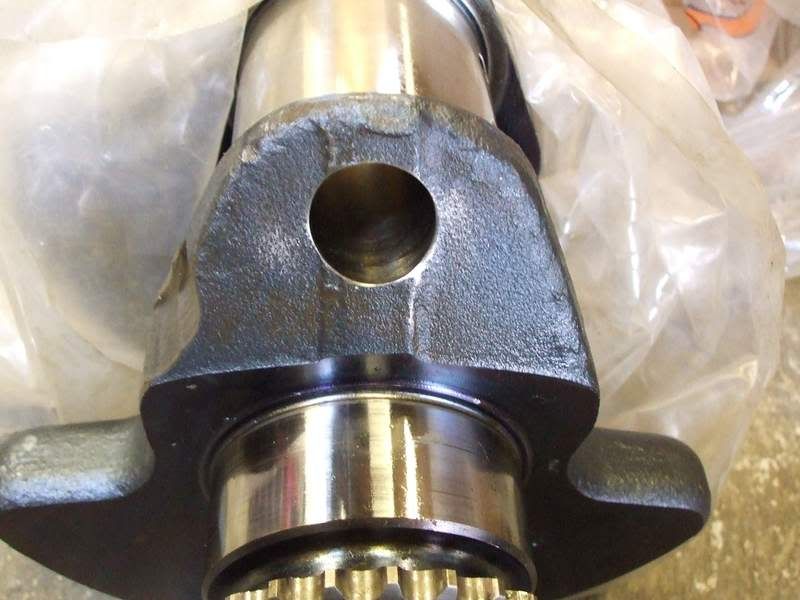Page 1 of 1
Cast or Forged
Posted: Fri Dec 21, 2007 2:12 pm
by Wotland
Hello, need of yours knowledges.
How it is possible to identify one forged crank ?
As I know the easy solution to identify forged crank is when you hit it with a hammer the cast crank will make a thud and the forged crank will ring like a bell.
Your opinion ?
Thank.
Posted: Fri Dec 21, 2007 3:52 pm
by sidecar
I believe that the "parting line" in a forged crank is much larger than say a cast one. This is due to much more excess metal being squeezed out than during the casting process.
Posted: Fri Dec 21, 2007 5:54 pm
by kiwicar
I would say the front one is cast the back one is forged from the sound of them.
Parting lines are a good check, a cast crank the parting line will be about 2 to 4 mm wide and ground off smooth a forged one will be 7 to 20 mm wide and have "scratch" lines in it perpendicular to the parting line, generally are not cleaned up with a grinder, they are also normally slightly domed across the parting line. The surface texture of the forged crank is much finer and almost satin. A cast carnk has a much more granular surface and is alot duller.
Hope that is some help.
Mike
Posted: Sun Dec 23, 2007 12:25 pm
by Boosted LS1
I'll go with the above. The difference is obvious once you know what to look for. If you can post up a pic of the terrier crank looking along the nose to the first counterweight we'll be able to tell you if cast or forged.
Photograph the joint, parting line where it's unmachined.
The 4.6 crank is a casting, if the terrier looks the same then it's a casting also. If the seams fat then it's a forging.
ETA. Here is a photo of my ls7 crank. See how wide the parting joint is around the lightening hole. This is a forged crank.

Posted: Sun Dec 23, 2007 6:30 pm
by Wotland
Thank you all for your help.
ASAP I will post an picture looking along the nose to the first counterweight
I found the noise information here :
http://www.carcraft.com/techarticles/11 ... index.html
Posted: Tue Dec 25, 2007 11:13 am
by Wotland
Hello,
First Merry christmas to all. I asked to my father to take pics.
Terrier crank (it is fully waxed) :
Factory 4.6 crank :
Posted: Tue Dec 25, 2007 6:17 pm
by Boosted LS1
It's a casting, look at how thin the joint line is.
Posted: Tue Dec 25, 2007 8:32 pm
by kiwicar

with what you can get out of Rover though I would not worry, cast Chevy cranks are meant to be good for 500 to 550 BHP and 7500 revs (in short bursts), don't see you going past either with a rover. If the bottom end is stablised with a good bottom end brace it will take alot of power and revs.
Happy christmas
Mike
Posted: Sun Mar 09, 2008 4:53 pm
by Wotland
Hello,
With regard to my post to identify if crank is cast or forged
I had an interesting discussion at the end of february with ex engineer for leyland Australia then JRA ( Jaguar rover Australia). He confirmed to me there were 2 engines in the 4.4 p76 family, the car (P76) crank was a normal casting, but it was decided that the Terrier truck required a steel forging for a longer life, the cranks are interchangable. The only way to tell which crank you have is by an Rockwell Hardness test apart from the surface texture.
So after Rockwell Hardness test like I have both P76 and Terrier crank, I had confirmation that the crank in my Terrier block is his genuine forged crank

.
Posted: Mon Mar 10, 2008 7:38 pm
by Boosted LS1
^ They can cast in steel or iron. If the parting line looks like a casting then it could still be cast in steel. The steel crank will weigh more then the cast crank.
